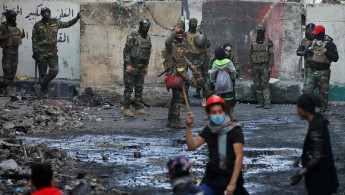Iraq paramilitaries stab anti-government protesters in horrific attack
Dozens of young men were attacked with knives, screwdrivers and other sharp objects in the back, abdomen, arm and thigh in or near Tahrir Square, a medical source told The New Arab’s Arabic-language service, adding that all those injured were in a stable condition.
Several thousand men, backing a host of paramilitary forces close to Iran, including the Hashd Al-Shaabi [PMF], also known as the Popular Mobilisation Forces, and the Hezbollah Brigades, entered the square in apparently coordinated marches on Thursday, waving sticks, Iraqi flags, and portraits of martyred fighters from the paramilitary, as well as pictures of the country's top Shia cleric, Grand Ayatollah Ali Sistani.
Comment: Kidnappings, killings and threats: Inside Iraq's authoritarian turn
Activist Maitham Ali added that among the group of attackers were members of the Hezbollah Brigades, a powerful Iran-backed armed group. Also involved were supporters of the Dawa Party and its "thugs", who aimed at intimidating protesters and provoke violent clashes, giving security services a pretext to launch a forceful crackdown on demonstrations.
 |
|
| A stabbing victim is assisted among the protests in Baghdad's Tahrir Square [Al-Araby Al-Jadeed] |
He also said that the groups were attempting to sabotage the protest movement, which has remained largely peaceful despite the deadly crackdown from government forces and its allied militias, by deploying sectarian and political slogans including anti-Saudi and anti-Israel chants, issues are largely unrelated to the demands of the protesters.
Social media footage from the scene show stabbing victims explicitly accusing militia fighters of being behind the attack.
The incident comes as factions loyal to both the Iraqi government and Iran have waged a campaign of violence and intimidation against opposition activists, who have been protesting government corruption and mismanagement, as well as Iranian interference, for over two months.
Alongside the killing of over hundreds of protesters, mostly shot dead by security forces, armed and masked militants have been seizing activists off the streets.
Mass rallies have rocked the capital and Shia-majority south since early October, first denouncing government graft and a lack of jobs before moving to broader demands for deep-rooted regime change.
Twitter Post
|
Protests ensue despite PM's resignation
Nearly 430 people have been killed and 20,000 wounded since demonstrations erupted, according to a toll compiled from medics, police and a national commission.
The victims' families have been demanding justice for their loved ones, and many of them hit the streets of Iraq's southern Diwaniyah on Thursday.
They joined thousands of other protesters, mostly teachers and students taking part in a general strike, according to an AFP correspondent.
"The authorities are putting off the issue of who killed our sons and brothers in the protests," said Assaad Malek, whose brother died in protest-related violence.
"They should take a tough stance and severely punish the officers and SWAT forces who killed my brother," he added.
A verdict for security force members accused of violence against protesters in Diwaniyah was scheduled for Thursday, but the session was indefinitely postponed.
In the southern hotspot of Nasiriyah, hundreds hit the main protest camp in the city centre, joined by delegations from the province's powerful tribes.
Tribal dignitaries intervened last week to scale down tensions between protesters and security forces after more than two dozen people were killed in a bloody crackdown.
The embattled prime minister, Adel Abdel Mahdi, resigned at the weekend, in a move that signals the weakness of the government but is unlikely to quell the protest movement.
Follow us on Twitter and Instagram to stay connected




 Follow the Middle East's top stories in English at The New Arab on Google News
Follow the Middle East's top stories in English at The New Arab on Google News


